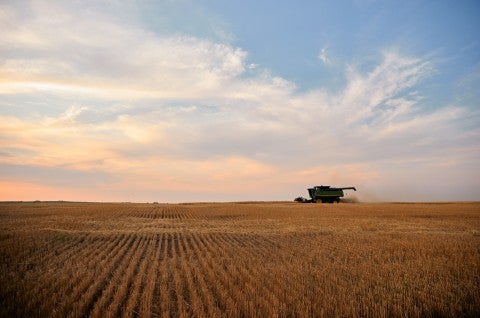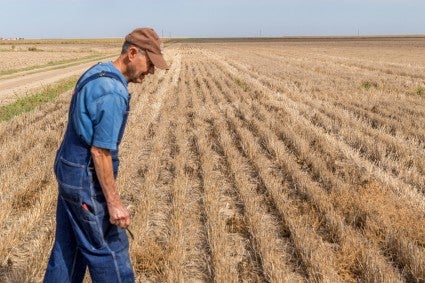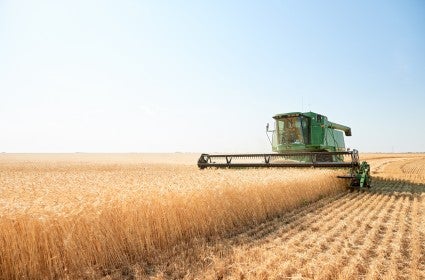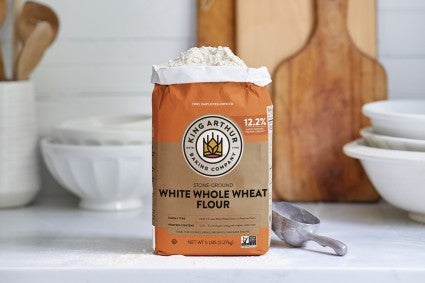What is regenerative agriculture, and why is it so important?
This critical approach to farming helps heal our land through flour.


As a baking company, King Arthur’s business depends on wheat. And wheat depends on farming.
As bakers (as well as a certified B Corp and triple-bottom-line business), that means we have a responsibility, both to the farmers we work with and the planet.
“We take our role and responsibility seriously in helping create a more resilient, equitable, and ecologically sound future — starting with wheat, where our decisions have the greatest impact,” says Suzanne McDowell, King Arthur’s Vice President of Corporate Social Responsibility and Sustainability.
Given that the heart of our business is flour, it only makes sense that we think critically as a company about wheat and how it can be grown, harvested, and milled in accordance with our values. That’s why by 2030, 100% of King Arthur flour will be sourced from regeneratively grown wheat.

Regenerative agriculture seeks to restore, renew, and enhance natural resources through a range of practices that focus on healthy soils, ecosystems, and farming communities. It’s not just about sustaining our planet, but actively healing it.
We consider regenerative agriculture a step up from sustainability — a way to shift agriculture from being part of the climate problem to being part of the solution. Examples of regenerative agriculture practices include cover cropping and crop rotations, minimizing inputs, no/limited tillage, and affordability and accessibility of crops.
It differs from organic agriculture in a few notable ways: Regenerative focuses on outcomes and principles, while organic is a labeling term that indicates products were produced by practices verified by the USDA — primarily without the use of synthetic pesticides and fertilizers.
This practice is also dedicated to improving the well-being of farmers and creating a future in which farming communities are economically viable and able to invest in practices that support the land. The goal is to create a system where farming is healthy for both the planet and for the people farming it. “It's sort of the ultimate version of sustainability,” says Dr. Stephen Jones, Director of Washington State University’s Breadlab, an organization committed to grain innovation and research with whom King Arthur has partnered since 2009.
While it’s especially critical for today’s planet, regenerative agriculture isn’t new — it embodies principles foundational to longstanding Indigenous land traditions, positioning humans as stewards of the land on which we live.

As King Arthur works toward our goal of sourcing 100% of our flour from regeneratively grown wheat, we recognize there’s a long road ahead. To achieve this benchmark, we’ll spend the next years learning from farmers and partners, acknowledging that we’ll need to adapt our strategies over time.
Because regenerative agriculture is as-yet unregulated and uncertified, we’re defining our own regenerative agriculture standards in collaboration with farmers and partners, working together to determine what changes truly makes sense for their land. Overall, our approach seeks these improvements:

We’re already incorporating regenerative agriculture into our work. All of our golden whole wheat flour is currently supplied by Farmer Direct, a collective that sources wheat from farmers committed to regenerative practices. “With the current rates of climate change, we have an ethical responsibility to produce wheat and flour as sustainably and nutritionally as we can,” says Farmer Direct chairman & CEO Tim Webster. “This not only benefits the earth, but also our growers’ livelihoods and the overall health of consumers.”
What’s more, King Arthur has enrolled in a 20,000+ acre regenerative pilot program with one of our milling partners, Ardent Mills in Kansas. We’ve also expanded our partnership with The Bread Lab to support their work breeding climate-resilient wheat that can withstand the chaotic effects of climate change, like fluctuating temperatures and water levels, that will eventually be the foundation for climate-friendly flour.
Moving forward, we’ll be partnering with farmers and millers to source from those already following regenerative practices and to convert additional acres where they’re not. We’ll participate in grower meetings to learn from producers and eventually develop new wheat sourcing guidelines; create a farmer engagement program that includes consistent regenerative wheat practices, outcome metrics, and traceability to source; and establish a council to guide us on best practices and hold us accountable on our regenerative endeavor. And in a decade, all of the wheat that is milled into flour sold under the King Arthur label will be regeneratively grown.
It will be hard work, to be sure. But we’re committed to embodying our values and taking initiative. Because ultimately, regenerative agriculture will benefit farmers, consumers, our planet, and, in turn, bakers everywhere.
To learn more about how to bake with the planet in mind, see our Sustainable Baking Guide.
Cover photo by Scott Slusher.

